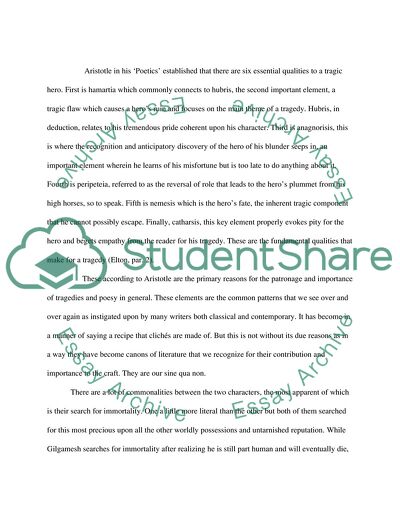
- Home
- Free Samples
- Premium Essays
- Editing Services
- Extra Tools
- Essay Writing Help
- About Us
- Studentshare
- Subjects
- Miscellaneous
- What does this comparison reveal about the meaning of a hero's relationship to his community
What does this comparison reveal about the meaning of a hero's relationship to his community - Essay Example

- Subject: Miscellaneous
- Type: Essay
- Level: Masters
- Pages: 4 (1000 words)
- Downloads: 0
- Author: phyatt
Extract of sample "What does this comparison reveal about the meaning of a hero's relationship to his community"
The hero is someone who is of high birth but not too virtuous as to be a saint yet not too devious as to be the protagonist. He can be both a hero and an antihero all at the same time (Elton, par. 2). But the elements that will play out through his story should pan out in a way that the audience would captivate the essence of the tragic flaw of the character and induce compassion in such a way that the audience fears for himself the same fate and hopes that the similar destiny eludes him in his lifetime.
Gilgamesh on the other hand, who is part god and part human, is also known for his misfortune in his quest for immortal life. He, in the same way as Achilles, is simultaneously honored and feared by his people. The mere creation of Enkidu, who subsequently became his friend and loyal companion, was created for his destruction because of the relentless punishments he subjects his people to. Aristotle in his ‘Poetics’ established that there are six essential qualities to a tragic hero. First is hamartia which commonly connects to hubris, the second important element, a tragic flaw which causes a hero’s ruin and focuses on the main theme of a tragedy.
Hubris, in deduction, relates to his tremendous pride coherent upon his character. Third is anagnorisis, this is where the recognition and anticipatory discovery of the hero of his blunder seeps in, an important element wherein he learns of his misfortune but is too late to do anything about it. Fourth is peripeteia, referred to as the reversal of role that leads to the hero’s plummet from his high horses, so to speak. Fifth is nemesis which is the hero’s fate, the inherent tragic component that he cannot possibly escape.
Finally, catharsis, this key element properly evokes pity for the hero and begets empathy from the reader for his tragedy. These are the fundamental qualities that make for a tragedy (Elton, par. 2). These according to Aristotle are the primary
...Download file to see next pages Read MoreCHECK THESE SAMPLES OF What does this comparison reveal about the meaning of a hero's relationship to his community
Ancient Middle East - Lesson 1
Film Evaluation Reports
William Shakespeare: Much Ado About Nothing
Neighbourhood Management and Urban Renewal
The Brief Wondrous Life of Oscar Wao
William Shakespeare - Much Ado About Nothing
Woochi - The Demon Slayer
Scarlet 1: A Study of the Use of Irony as a Literary Device in the Scarlet Letter

- TERMS & CONDITIONS
- PRIVACY POLICY
- COOKIES POLICY